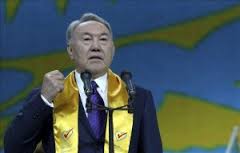 Not long ago it all looked so much better: oil prices were high, the middle classes were growing and the autocrat-father of the state, Nursultan Nazarbayev, presided over 17m grateful subjects. Yet today the situation in Kazakhstan looks more troubling than at any time since the country broke free of the Soviet Union to become, against the odds, Central Asia’s most prosperous state. To many, Mr Nazarbayev’s promise of a “Kazakh dream” now seems like a sick joke.
Not long ago it all looked so much better: oil prices were high, the middle classes were growing and the autocrat-father of the state, Nursultan Nazarbayev, presided over 17m grateful subjects. Yet today the situation in Kazakhstan looks more troubling than at any time since the country broke free of the Soviet Union to become, against the odds, Central Asia’s most prosperous state. To many, Mr Nazarbayev’s promise of a “Kazakh dream” now seems like a sick joke.
An overreliance on oil is what makes the Kazakh economy so fragile. Since the price crashed, export revenues have tumbled. The currency, the tenge, has fallen by half since August. That has squeezed wages and savaged household consumption. An economy that grew by over 5% in 2013 may contract this year, for the first time since 1998. It has not helped that growth is stalling in China, Kazakhstan’s second largest trading partner, while Russia, its largest, is now deep in recession.
All this is hurting ordinary folk. In a rare protest in a closely controlled state, two dozen homeowners gathered outside a bank in Almaty, the commercial capital, last week. They were complaining about their mortgages, and they are unlikely to be the last to do so. Many mortgages are denominated in dollars, so the cost of servicing them has soared.
The government is dealing with the financial crunch with an odd mix of stimulus and austerity. On the stimulus side is a $9-billion investment package to boost non-oil sectors such as manufacturing, as well as perks for foreign investors as a fire sale of state assets gets under way. Public-sector salaries and pensions have been raised, and schemes introduced to help savers and mortgage holders suffering from the currency’s fall.
As for austerity, public spending is to be cut in other areas, though in ways supposed to protect the worst-off. Even a swords-and-stallions TV drama about Kazakh history, intended to create a nobler and more accurate image of Kazakhstan than “Borat”, has lost some of its state funding. The budget deficit is likely to balloon despite some help from the sovereign wealth fund.
As grievances mount, political stability comes into question. The president keeps chanting an all-in-it-together mantra, but the calls for austerity by this head of a fabulously wealthy clan may wear thin. The question is how he might react to signs of greater dissatisfaction. Mr Nazarbayev has run Kazakhstan since before the Soviet Union collapsed, wielding a very personal sort of power even as international statesmen and highly paid public-relations firms have helped to polish a veneer of liberalism and democracy. Last year Mr Nazarbayev promised a “modern state apparatus”, and in the past he has talked of creating a resilient political system. But current conditions can hardly seem to him an opportune time for political change. There has been no move towards proper reform.
Meanwhile, the regime has kept a heavy lid on dissent ever since dozens of striking oil workers were gunned down by security forces in Zhanaozen in western Kazakhstan in late 2011. An opposition leader, Vladimir Kozlov, is in jail on trumped-up charges of fomenting that turmoil, which prompted a massive crackdown on the political opposition and independent media. Last week two dissidents were jailed on spurious charges of inciting racial hatred, following a Kafkaesque trial sparked by a discussion on Facebook about an unpublished book written two decades ago.
“Presidents come and go,” one of those dissidents, Serikzhan Mambetalin, said during his spirited defence, “But the people remain.” Tell that to Mr Nazarbayev. He turns 76 in July, but shows no sign of going. Not least—and this spells trouble for the future—he has signally failed to provide for his succession.
Meanwhile, though Mr Nazarbayev would probably win anyway if presidential elections were free and fair, he takes no chances. He won the last election with 98% of the vote; in the past even other presidential candidates voted for the father of the state. In late January Mr Nazarbayev set a date of March 20th for parliamentary elections. Supposedly, they are in order to provide a fresh mandate to boost growth. In practice they will produce another rubber-stamp legislature to do the president’s bidding. However stage-managed the elections, they may fail to mask the cracks likely to emerge as the economy slows.
The Economist, Jan 30th 2016




